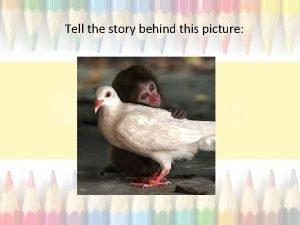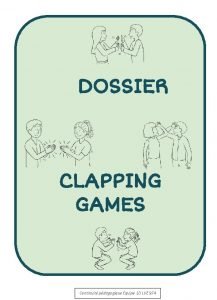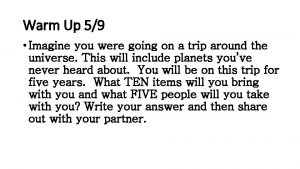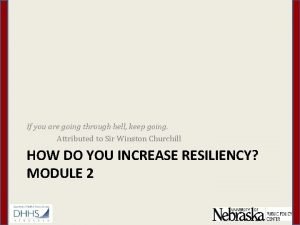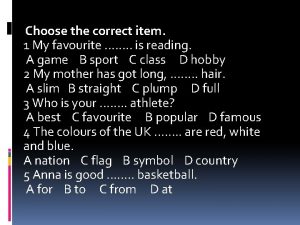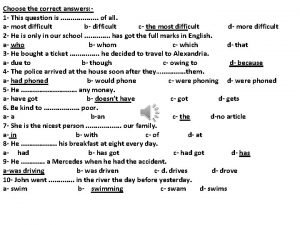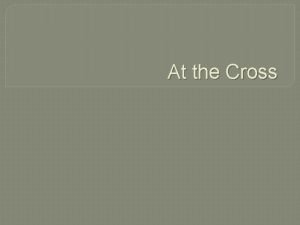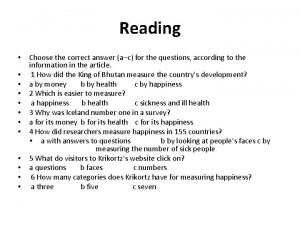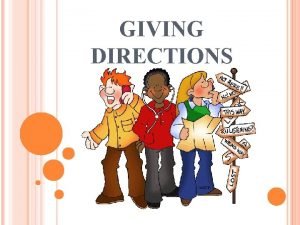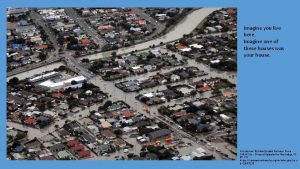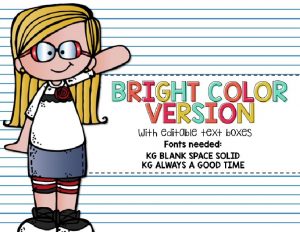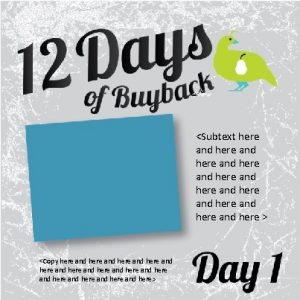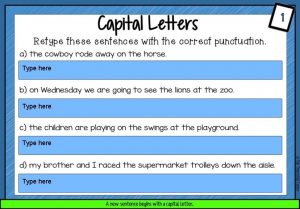Imagine you are going to live here Choose



















- Slides: 19

Imagine you are going to live here. Choose three items which you think are the most important to take with you.

What do you think we are studying today?

Lesson Objective To compare constructive and destructive waves Literacy Objective Spelling of key words

Learning Outcomes • Lower level skills • To describe constructive and destructive waves (Level 5) • To compare constructive and destructive waves (Level 6) • Higher level skills • To apply your knowledge of constructive and destructive waves (Level 7)

Swash and Backwash Watch the video http: //www. youtube. com/watch? v=FWKnfuwyo. Ec Can you explain how the waves move?

Swash and Backwash Now it’s your turn to imitate the processes of swash and backwash! Which way will you move for swash? Which way for backwash?

Swash and Backwash In the box on your sheet, draw a diagram to illustrate swash and backwash. You can use arrows to help. Make sure you label the diagram and explain what is happening.

Progress Check 1 In your first wave, answer the question which applies to you: What is swash? How is swash different from backwash? How will swash and backwash be different in the summer compared to in the winter?

WAVE ACTION THINK: WHICH PART OF THE UK COASTLINE WILL BE AFFECTED BY WAVES WITH A GREAT FETCH? LOOK AT A MAP TO HELP YOU COME TO A CONCLUSION! The size of a wave depends on its fetch. The fetch is the distance a wave travels. The greater the fetch, the larger the wave. Wind also has a significant effect on the size of waves. The stronger the wind the larger the wave. As a wave approaches a beach it slows. This is the result of friction between the water and the beach. This causes a wave to break.

Waves THAT hit the South West of the UK may have travelled THOUSANDS of miles before they hit land. What do you think these waves will be like?

Destructive Constructive A minute in pairs to think about all of the characteristics you need to be constructive and destructive

Create your own Character • Choose either constructive or destructive waves • Create your own character to imitate this wave type – what kind of job might your character do? What sort of a person might they be?

Constructive and Destructive Waves • Destructive waves are waves that ______ coastlines. Backwash is ____ than swash. • Constructive waves are waves that _____ up beach _______ to create landforms. build erode greater material

More about the waves. . • On your sheet their is a web address. Type this into your i. Pad to help you discover the characteristics of each type of wave. http: //www. curriculumbits. com/prodimages/details/geograph y/geo 0003. html Can you sketch the different beaches each type of wave creates?

Progress Check 2 In your second wave, answer the question which applies to you: What is a destructive wave like? If backwash is greater than swash, what will happen to the beach? How do different waves affect the beach profile?

Progress Check 3 – Plenary Activity Different Types of Waves I know the difference between swash and backwash. I can compare the characteristics of constructive and destructive waves. I know how constructive and destructive waves affect the shape of the beach. Feeling great Nearly there Oh dear, not very clear What Went Well: Even Better If:

Learning Outcomes • Lower level skills • To describe constructive and destructive waves (Level 5) • To compare constructive and destructive waves (Level 6) • Higher level skills • To apply your knowledge of constructive and destructive waves (Level 7)

Destructive Waves Destructive waves destroy beaches. The waves are usually very high and very frequent. The back wash has less time to soak into the sand. As waves continue to hit the beach there is more running water to transport the material out to sea. these waves are most common in winter.

Constructive waves build beaches. Each wave is low. As the wave breaks it carries material up the beach in its swash. The beach material will then be deposited as the backwash soaks into the sand or slowly drains away. These waves are most common in summer.
 The story behind this picture
The story behind this picture Mikael ferm
Mikael ferm Lve
Lve Imagine you are going
Imagine you are going Imagine you are going
Imagine you are going Imagine you are going
Imagine you are going If you are going through hell, keep going means
If you are going through hell, keep going means If you can imagine it you can achieve it
If you can imagine it you can achieve it Where are you going where have you been vocabulary
Where are you going where have you been vocabulary Where are you going where have you been annotations
Where are you going where have you been annotations Choose the correct item.
Choose the correct item. A. choose the correct answer.
A. choose the correct answer. There's a place where mercy reigns and never dies
There's a place where mercy reigns and never dies Choose the correct answer ac
Choose the correct answer ac You can't turn right here
You can't turn right here Turn left go ahead
Turn left go ahead Quizlet.com/live
Quizlet.com/live Birmingham and solihull stp
Birmingham and solihull stp You live to learn
You live to learn Imagine this if you had $86 400
Imagine this if you had $86 400
